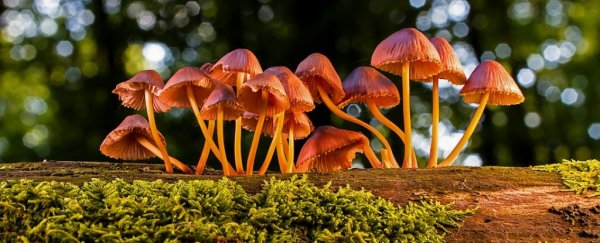The United States may soon begin to loosen its grip on 'magic mushrooms', a legal fist that's been shaking since 1970.
In the 2019 elections, residents of Denver, Colorado will be voting on whether to decriminalise the possession of small amounts of psilocybin, the active ingredient in magic mushrooms.
In addition, there are a number of grassroots movements advocating for the same all over the country, especially in the state of Oregon, according to a report from Vice.
Even if these initiatives fail, as they did in California last year, there are several reasons to believe the rules might be softened in the near future.
Psilocybin is currently classified as a Schedule I drug in the US, meaning it is a felony if someone is caught in possession of it. Substances that fall into this category are deemed to have a high potential for abuse with no accepted medical use.
But while this may well describe a highly-addictive and lethal drug like heroin, from what scientists at Johns Hopkins University can tell, it does not fully apply to psilocybin.
In a 2018 analysis, these researchers found that despite its classification, psilocybin has manageable side effects and low-enough potential for abuse "if approved as medicine".
This isn't to say that psilocybin doesn't hold any harmful effects. The authors simply argue that psilocybin would fit better as a Schedule IV substance, keeping company with other drugs that have a "low potential for abuse and low risk of dependence", like benzodiazepines (eg. Xanax).
"We want to initiate the conversation now as to how to classify psilocybin to facilitate its path to the clinic and minimise logistical hurdles in the future," psychiatrist Matthew W. Johnson from the Johns Hopkins University School of Medicine said last September.
"We expect these final clearance trials to take place in the next five years or so."
It's not just a handful of scientists that are coming around to the idea. A massive report from the Global Drug Survey in 2017 found that psilocybin was one of the safest drugs on the market, sending the absolute fewest people to the emergency room.
What's more, the drug has real promise as a medical treatment in certain areas. Some research suggests psilocybin could be a better alternative to current depression treatments. Others suggest it could be a useful way to treat addiction.
In Denver, those who support the measure are hoping it can reduce psychological stress and opioid dependence. Although, because of federal restrictions, the studies that are finding such benefits are still largely in their infancy.
Lest it be misunderstood, advocates of decriminalisation in these states are not proposing that psilocybin no longer be considered a drug, or that it become completely legal.
In Denver, the campaigners say that magic mushrooms will still maintain the same classification and legality, they will simply be a low priority for law enforcement overall. In Oregon, the campaigners want to regulate psilocybin use at licensed facilities, while also decriminalising possession, manufacture and delivery.
This isn't some pie-in-the-sky hippie dream - at least not any more. The US Drug Enforcement Agency also places marijuana in the same category as magic mushrooms, and in Colorado and Oregon, where marijuana is legally sold and grown, we have already seen how that has worked out.
In fact, Oregon just recently reclassified the possession of several drugs such as heroin, cocaine, and methamphetamine from a felony to a misdemeanour in the hopes of curbing the region's drug abuse. It seems only natural that residents in the state now go for psilocybin.
With each year it seems more likely that magic mushrooms are set to join the ranks of drugs-turned-medical-treatments, and as far as we can tell, science shows this idea has merit.
